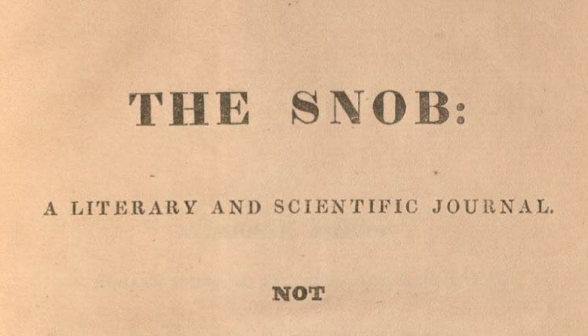Moll of Wapping: An Eastern Tale, Part 2
by Anonymous
The Snob: A Literary and Scientific Journal, vol. 1, issue 5 (1829)
Pages 25-26

Introductory Note: Though very short, “Moll of Wapping,” was the longest piece of short fiction found in The Snob and was published in serial format. The story’s light-hearted, facetious tone and overblown verbiage are in line with the rest of the journal—tongue-in-cheek comments and satire abound. “Moll of Wapping” is essentially a nonsense story. It follows Moll, a horrendously ugly middle-aged woman, and her lover, Sooty Dobbs.
The Snob was written and edited by students of the University of Cambridge. The story’s depictions of members of the lower classes, presumably written by a by well-to-do Cambridge student, demonstrate town-gown, snobbish, farcical humor.
Serial Information
This entry was published as the second of three parts:
But she, unconscious of her breathing sweetness, strode firmly on, and already had she passed o’er half her tedious journey, unseeing and unseen, when suddenly a voice, rough as a door-mat, swept, like the parish-scavenger, all down the street, and in harsh accents broke upon her ear, “Go it, my kiddy,—you’re the ticket, though I says it as should’nt,—cut along my rum un, never say die.” These were the sounds that rolled their undulating existence through the atmosphere of tangible disgust, and started Molly from her reverie. She, turning round, three whiffs of heartfelt exultation gave, for she perceived that, trotting on his five-and-forty shilling freeholder, came sooty Dobbs. But let me pause a moment, while
“I vainly try to tell
“The thousand graces of this covish swell.”
A cap, which always “puzzled the wig,” as Hamlet has it, so many hair-breadth escapes did it allow, covered half his capillary excrescences.; the other half, like many late M.P.’s1Original footnote: “Modern perriwigs.—Printer’s devil.” had deserted their constituents, and stood on end in beautiful irregularity; of this quality likewise his nose partook, for two-thirds down it bore the impress of Rome and nobleness, but then at once it changed its course, and became not gradually and without hesitation, but suddenly and with startling promptitude, a decided turn-up,—it would have seemed as if aspiring to catch the dews and breezy softness of heaven, had not, in the sublime words of Milton,
“Its hairy sides
“With thicket overgrown, grotesque and wild,
“Access denied.”2“Puzzled the wig” is a parody of the line “puzzles the will” from Hamlet III:I. An “excresence” is a growth which is usually the result of a disease. Traditionally “M.P.” stands for “Member of Parliament.” The passage quoted from Milton references Paradise Lost, 4.5-7.
to all that dared approach its sacred penetralia. How stupendous! How magnanimous the change! Well might his nose swell with the vanity of liberalism; well might his eyes dwell with the squint of continued delight on this interesting instance of nasal independence.
(To be continued.)
Word Count: 387
This story is continued in Moll of Wapping: An Eastern Tale, Part 3.
Original Document

Topics
How To Cite (MLA Format)
“Moll of Wapping: An Eastern Tale, Part 2.” The Snob: A Literary and Scientific Journal, vol. 1, no. 5, 1829, pp. 25-6. Edited by Amanda Seeley. Victorian Short Fiction Project, 28 February 2026, https://vsfp.byu.edu/index.php/title/moll-of-wapping-part-2/.
Editors
Amanda Seeley
Cosenza Hendrickson
Alexandra Malouf
Posted
11 January 2021
Last modified
27 February 2026
Notes
| ↑1 | Original footnote: “Modern perriwigs.—Printer’s devil.” |
|---|---|
| ↑2 | “Puzzled the wig” is a parody of the line “puzzles the will” from Hamlet III:I. An “excresence” is a growth which is usually the result of a disease. Traditionally “M.P.” stands for “Member of Parliament.” The passage quoted from Milton references Paradise Lost, 4.5-7. |



